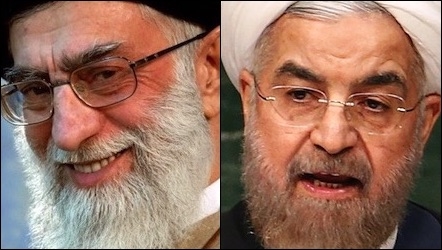|
|
Follow the Middle East Forum
|
The New York
Times Still Falls for Ben Rhodes' Iran Lies
Central to the Obama administration's case for the Iran nuclear deal was the narrative that the election of Hassan Rouhani and other Iranian "moderates" made the deal possible. Deputy National Security Advisor for Strategic Communications Ben Rhodes admitted, in a New York Times article no less, that such a story was "the center of the arc" of a narrative that was "largely manufactured" for the purpose of selling the deal. On some level, the narrative worked: it fooled much of the public, the press, and well over 100 members of Congress. The New York Times certainly swallowed this narrative, hook, line, and sinker, and the Times hardly stands alone -- but the paper has indeed been the most prominent, slavishly devoted dupe.
And Rouhani is simply not a moderate, as Rhodes essentially admitted. Instead, he is a master deceiver. He feigns his concern for human rights, but according to UN Special Rapporteur on Human Rights Ahmed Shaheed and former opposition leaders, human rights have actually gotten worse under Rouhani. Shaheed believes that this has escaped widespread attention because of the focus on the nuclear deal.
However, and in spite of the implausibility of the narrative, not to mention Rhodes having explained his cynical manipulation to the Times itself, the Times continues to insist on the centrality of this fictional "moderates/hard-liners" dynamic in understanding Iran's behavior. Literally the day after the Times published Rhodes' explanation of his falsehoods, the Times opened up its editorial page to excoriate not Iran, but the United States.
Another story, published six days after the Rhodes mea culpa, played up the moderate/hardliner narrative while ironically proving it false. It seems that a woman, Minoo Khaleghi, was elected to Parliament -- but was ruled ineligible because she broke Iranian law by being photographed without her hijab, something she denies. The Times later reported on the "hardliners" more general crackdown on women who don't wear headscarves. Assuming Ms. Khaleghi is a real moderate, her ineligibility proves again that hardliners hold all the power. Such self-contradictory reporting has continued unabated with the re-election of Parliamentary Speaker Ali Larijani. According to the Times, Larijani's landslide victory was a "mild surprise" since "reformists" had done so well in February elections. It never occurred to the Times that Iranian officials' actions might not match up with the "reformist" label. Even when "moderates" win in Iran, they either aren't actually moderates or are not allowed to hold power.
Of course, there are plenty of moderate voices and genuine would-be reformers in Iran. The Iranian people's spontaneous organization during the "green revolution" and the ongoing saga of the frequently imprisoned but irrepressible filmmaker Jafar Panahi are just two examples that demonstrate moderate, reformist sentiments exist outside of government. But the idea that a moderate/hardliner conflict affects how the current Iranian regime behaves toward the U.S. is false. Further, the Times knows it is false based on its own reporting. However, it just keeps reporting it as fact, and even Agent Mulder didn't want to believe that badly. Clifford Smith is director of the Middle East Forum's Washington Project. |
||||||||
|
To subscribe to the MEF mailing lists, go to http://www.meforum.org/list_subscribe.php |









































No comments:
Post a Comment